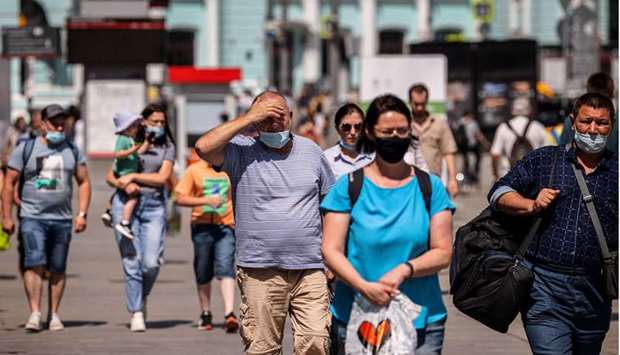Saint Petersburg on Monday imposed fresh restrictions to curb the spread of the coronavirus with cases rising in the city ahead of matches in the postponed Euro 2020 tournament.
City officials announced a ban on food sales in the Euro fan zone and the closure of food courts in shopping centres.
In a televised appearance Monday, President Vladimir Putin said ‘the danger of the coronavirus has not receded’ and that ‘in several regions the situation is getting worse’.
Saint Petersburg and the capital Moscow have faced a recent surge in new coronavirus infections amid a slow vaccination campaign.
The number of daily cases in Saint Petersburg on Monday passed a thousand for the first time since February, according to a government tally.
And Moscow recorded 7,584 daily cases after reporting more than 9,000 cases for two days in a row last week, their highest figures since the outbreak started.
Moscow mayor Sergei Sobyanin says around 90 percent of the new cases are caused by Delta, a more contagious variant of the coronavirus first identified in India.
He also said that there were instances of vaccinated people and those who already had coronavirus testing positive.
But Alexander Gintsburg, head of the state-run Gamaleya research centre which developed Sputnik V, however, said Sunday that the jab's two doses ‘protect against all currently known variants, from the British to the Delta variant’.
- Mandatory vaccination –
Gintsburg's remarks came as officials struggle to get people to take the vaccine, despite their being free and widely available in Moscow.
Last week, Moscow announced mandatory vaccinations, requiring some 60 percent of service workers -- about two million people -- to get fully inoculated by August 15.
Saint Petersburg followed suit announcing plans to vaccinate 65 percent of local state workers by August.
A video shared by local media outlets on Sunday showed one overwhelmed Saint Petersburg hospital with patients lying on the floor in the corridor.
Russia, with 129,801 deaths recorded by the government, is the hardest hit country in Europe.
Under a broader definition for deaths linked to Covid, statistics agency Rosstat has counted at least 270,000 deaths since the pandemic began.

